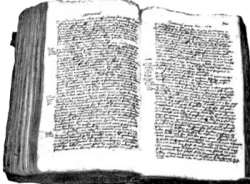Constitution
In an article he wrote for the Annual Bulletin of La Société in 1955, George Balleine stressed the importance of going back to original documents whenever they are available. This is proved by the general acceptance before Balleine's history was published of the idea that King John laid down the basic structure of the island's constitution in an 18-clause latin document. This document was published by The Rev Philippe Falle in his An account of the Island of Jersey, the greatest of those islands that are now the only remainder of the English dominions in France, with a new and accurate map of the Island in 1694, which was for a long time recognised as the definitive history of the island. But Balleine and subsequent researchers have proved that this 18-clause document had little or nothing to do with King John and arose out of a 17th century briefing given to a new Governor not so much on what the island's constitution was, but what it would have liked it to be.
Inaccuracies in an historical work which is generally viewed to be reliable are easily perpetuated down the centuries.
Bailiffs' records
But the problem facing Jersey's historians is that there are precious few original documents in existence in the island dating back before 1502. This is because Jersey's Bailiffs were used to keeping the official documents relating to their period of office in their homes and often retaining possession of them in retirement. In his memoirs Lord Coutanche notes that even in the late 19th century Bailiffs would regard records from their term of office as their personal property.
- "Sir George Bertram (Bailiff until 1898) had kept careful records of his Bailiffship and of his Attorneyship, but he regarded these as his personal property, as his predefessors had done, since he had paid for all his stationery out of his own pocket, and on his retirement, had taken them away with him. The result was that his successors in office found nothing to guide them in regard to the past."
Fire
So it was at the end of the 15th century, when Thomas Lempriere was Bailiff. A disastrous fire at his house in Halkett Place in 1502 means that any of the island's precious documents which passed down to him, in addition to those created in the first seven years of his own tenure of office, were destroyed.[1]
And in more recent years, some of the priceless documents with references to the Channel Islands in Norman times, which were held in the archives of the French département of La Manche at St Lo, were destroyed during the Second World War. Fortunately some of these had been transcribed and translated at the end of the 19th century and have thus been preserved, but the originals are gone for ever.
In his 1955 article Balleine showed that there are many different records which can help trace the course of island history from 1502 onwards, but very little survives from before. La Société has part of a Roll of 1294 listing dues on wheat and wool, a sealed Order from Richard III (1485) concerning a dispute about possession of Trinity Manor, and an Act with the Bailiff's seal (1487) registering the appointment by Henry VII of two Governors. The States own an Inspeximus by Richard II (1378) confirming the island's privileges; Letters Patent from Francois, Duke of Brittany in 1484, concerning the island's neutrality, and a 1499 Charter of Henry VII permitting the importation of cattle from England.
16th Century
And that is about it, except for some documents in private possession, until the 16th Century. La Société possesses a 1512 Inspeximus sealed with Henry VIII's Great Seal, confirming the island's neutrality; a Royal Commission of (1515) with the Great Seal appointing Commissioners to inquiry into a dispute between Governor and Bailiff, and a petition from the island to Cardinal Wolsey in 1524 seeking protection from pirates.
Diaries
Much of what is known about the island's past is contained in two diaries. The first Les Chroniques de Jersey is an anonymous work written in 1558. It covers earlier centuries, albeit somewhat sketchily, but from the 16th century it is a document of enormous historical importance, and has been proved, by cross-referencing with other material, to be an accurate record of island life. So, too, are the 17th century diaries of Jean Chevalier, who wrote in considerable detail about the day-to-day life of the island in the Civil War and the years leading up to it.
Royal Court
Acts of the Royal Court in existence start in 1504 with records of the Cour de Câtel, and continue until the abolition of this court in 1863. There are judgments in existence of the Cour d'Heritage, which deals with land transactions, dating back to 1389, but the first surviving Act book dates from 1506. The workings of the Cour de Samedi, so called because it originally sat on Saturdays Cite error: Closing </ref> missing for <ref> tag
Cite error:
<ref> tags exist, but no <references/> tag was found
